Track athlete Oscar Pistorius attends his hearing in the Pretoria courtroom on 19 February 2013.
- Oscar Pistorius' lawyer read out his affidavit as he was too distraught to read it himself
- "I had no intention to kill my girlfriend," the statement says
- Pistorius claims he and Reeva "were deeply in love and couldn't be happier"
- "I tried to help her but she died in my arms. I am mortified," the statement reads
Pretoria (CNN) -- Oscar Pistorius' attorney read out the track star's affidavit to the judge in the Pretoria courtroom during the bail hearing, Tuesday. The athlete was too distraught to read out the statement himself.
The affidavit reads as follows:
I, the undersigned, Oscar Leonard Carl Pistorius, do hereby make oath and state:
I am an adult male and a South African citizen with identity number [identity number redacted].
I am the Applicant in this application in which I seek relief from this Honourable Court to be released on bail. I respectfully submit, as I will demonstrate herein, that the interests of justice permit my release on bail. In any event, the dictates of fairness and justice in view of the peculiar facts herein warrant that I should not be deprived of my liberty and that I should be released on bail.
I make this affidavit of my own free will and have not in any way been unduly influenced to depose thereto.
The facts herein contained, save where expressly indicated to the contrary, are within my personal knowledge and belief, and are both true and correct.
The purpose of this affidavit is to provide the above Honourable Court with my personal circumstances and to address the allegations levelled against me (in so far as they are known to me), as well as to address the factors to be considered by the above Honourable Court as contained in Sections 60(4) to 60(9) of the Act.
I have been advised and I understand that I bear the burden to show that the interests of justice permit my release and that I am obliged to initiate this application. I fail to understand how I could be charged with murder, let alone premeditated murder, as I had no intention to kill my girlfriend, Reeva Steenkamp ("Reeva"). However, I will put factors before the Honourable Court to show that it is in the interests of justice to permit my release on bail.
I state that the State will not be able to present any objective facts that I committed a planned or premeditated murder. For this reason I will hereunder deal with the events which occurred that evening. The objective facts will not refute my version as it is the truth.
I am a professional athlete and reside at [address redacted].
I was born on 22 November 1986, at Johannesburg. I have resided in the Republic of South Africa ("the RSA") all my life, and although I frequently travel abroad to participate in international sporting events, I regard South Africa as my permanent place of abode. I have no intention to relocate to any other country as I love my country.
I own immovable assets in South Africa, which consist of the following:
The immovable property in which I currently reside, at [address redacted] ("the residential premises"). This property is valued at approximately R5 million and is encumbered by a mortgage bond in the amount of approximately R2 million.
Two further immovable properties located within Weeping Willow Estates, Pretoria East, which properties have a combined value of approximately R1,6 million. Both properties are bonded to an aggregate value of approximately R1 million.
A vacant stand in Langebaan, Western Cape, which has a value of approximately R1,7 million. This property is not bonded.
I own movable assets comprised of household furniture and effects, motor vehicles and jewellery, which are valued in excess of R500 000,00.
My friends and family reside in the RSA, although I also have friends abroad.
My professional occupation currently provides me with an income of approximately R5,6 million per annum.
I have cash investments in excess of R1 million at various banks within the RSA.
I have never been convicted of any criminal offences either in the RSA or elsewhere. There are no outstanding cases, other than the present, being investigated against me by the South African Police Services ("SAPS").
My legal representatives have explained the provisions of Section 60(11) of the Act to me. I respectfully make the following submissions in this regard:
I have been informed that I am accused of having committed the offence of murder. I deny the aforesaid allegation in the strongest terms.
I am advised that I do not have to deal with the merits of the case for purposes of the bail application. However, I believe that it is appropriate to deal with the merits in this application, particularly in view of the State's contention that I planned to murder Reeva. Nothing can be further from the truth and I have no doubt that it is not possible for the State to present objective facts to substantiate such an allegation, as there is no substance in the allegation. I do not know on what different facts the allegation of a premeditated murder could be premised and I respectfully request the State to furnish me with such alleged facts in order to allow me to refute such allegations.
On the 13th of February 2013 Reeva would have gone out with her friends and I with my friends. Reeva then called me and asked that we rather spend the evening at home. I agreed and we were content to have a quiet dinner together at home. By about 22h00 on 13 February 2013 we were in our bedroom. She was doing her yoga exercises and I was in bed watching television. My prosthetic legs were off. We were deeply in love and I could not be happier. I know she felt the same way. She had given me a present for Valentine's Day but asked me only to open it the next day.
After Reeva finished her yoga exercises she got into bed and we both fell asleep.
I am acutely aware of violent crime being committed by intruders entering homes with a view to commit crime, including violent crime. I have received death threats before. I have also been a victim of violence and of burglaries before. For that reason I kept my firearm, a 9 mm Parabellum, underneath my bed when I went to bed at night.
During the early morning hours of 14 February 2013, I woke up, went onto the balcony to bring the fan in and closed the sliding doors, the blinds and the curtains. I heard a noise in the bathroom and realised that someone was in the bathroom.
I felt a sense of terror rushing over me. There are no burglar bars across the bathroom window and I knew that contractors who worked at my house had left the ladders outside. Although I did not have my prosthetic legs on I have mobility on my stumps.
I believed that someone had entered my house. I was too scared to switch a light on.
I grabbed my 9mm pistol from underneath my bed. On my way to the bathroom I screamed words to the effect for him/them to get out of my house and for Reeva to phone the police. It was pitch dark in the bedroom and I thought Reeva was in bed.
I noticed that the bathroom window was open. I realised that the intruder/s was/were in the toilet because the toilet door was closed and I did not see anyone in the bathroom. I heard movement inside the toilet. The toilet is inside the bathroom and has a separate door.
It filled me with horror and fear of an intruder or intruders being inside the toilet. I thought he or they must have entered through the unprotected window. As I did not have my prosthetic legs on and felt extremely vulnerable, I knew I had to protect Reeva and myself. I believed that when the intruder/s came out of the toilet we would be in grave danger. I felt trapped as my bedroom door was locked and I have limited mobility on my stumps.
I fired shots at the toilet door and shouted to Reeva to phone the police. She did not respond and I moved backwards out of the bathroom, keeping my eyes on the bathroom entrance. Everything was pitch dark in the bedroom and I was still too scared to switch on a light. Reeva was not responding.
When I reached the bed, I realised that Reeva was not in bed. That is when it dawned on me that it could have been Reeva who was in the toilet. I returned to the bathroom calling her name. I tried to open the toilet door but it was locked. I rushed back into the bedroom and opened the sliding door exiting onto the balcony and screamed for help.
I put on my prosthetic legs, ran back to the bathroom and tried to kick the toilet door open. I think I must then have turned on the lights. I went back into the bedroom and grabbed my cricket bat to bash open the toilet door. A panel or panels broke off and I found the key on the floor and unlocked and opened the door. Reeva was slumped over but alive.
I battled to get her out of the toilet and pulled her into the bathroom. I phoned Johan Stander ("Stander") who was involved in the administration of the estate and asked him to phone the ambulance. I phoned Netcare and asked for help. I went downstairs to open the front door.
I returned to the bathroom and picked Reeva up as I had been told not to wait for the paramedics, but to take her to hospital. I carried her downstairs in order to take her to the hospital. On my way down Stander arrived. A doctor who lives in the complex also arrived. Downstairs, I tried to render the assistance to Reeva that I could, but she died in my arms.
I am absolutely mortified by the events and the devastating loss of my beloved Reeva. With the benefit of hindsight I believe that Reeva went to the toilet when I went out on the balcony to bring the fan in. I cannot bear to think of the suffering I have caused her and her family, knowing how much she was loved. I also know that the events of that tragic night were as I have described them and that in due course I have no doubt the police and expert investigators will bear this out.
I will stand my trial should it proceed against me. I am a well-known international athlete and there is no possibility that I will even think of not standing my trial should there be one. I trust the South African legal system and that the facts will show that I did not murder Reeva.
In order to persuade the above Honourable Court that I should be released on bail, I provide the following additional facts and information in terms of Section 60 of the Act.
I do not know the identity of any witness upon whom the State will rely in order to attempt to prove a case against me. In any event, I have no intention to interfere with any witnesses as I have no cause to do so and I undertake not to do so.
I maintain good relationships with people and I bear no grudges against anyone.
As previously stated, I have no previous convictions and I have not been released on bail pending any charges.
I am not disposed to violence.
I respectfully submit that the facts set out above support my contention that I do not constitute a flight risk.
I have two South African passports, the one is full. I need my passport to compete overseas but I am willing to surrender the passports to the investigating officer should it be a condition of bail. I am not in possession of any other travel documents and undertake not to apply for such documentation pending the finalisation of these proceedings.
After the shooting I did not attempt to flee. Rather, I accepted Stander would contact the police, and I remained at the scene.
I will be able to raise an appropriate amount to post as bail.
I have no knowledge of any evidentiary material which may exist with regard to the allegations levelled against me. In any event, I believe that whatever such evidence may be, it is in the possession of the police; it is safely secured and I do not have access thereto. I undertake not to interfere with any further investigations.
I am not sure which witnesses the State will rely upon in order to attempt to prove its case against me. Nonetheless, I undertake not to communicate with any witness, whoever he or she may be, and any other persons whose names may appear on a list of "State witnesses", to be provided by the State.
My continued incarceration can only prejudice me and creates no benefit to the State.
I respectfully submit that should I be released on bail, my release shall not disturb the public order or undermine the proper functioning of the criminal justice system.
I will comply with such conditions as the above Honourable Court may wish to impose.
I accordingly submit that the interests of justice, considerations of prejudice and the balancing of respective interests favour my release on bail.


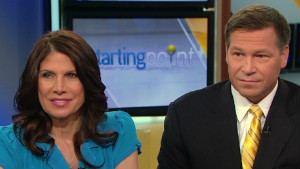
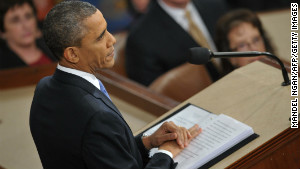

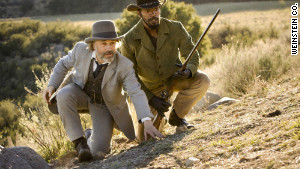


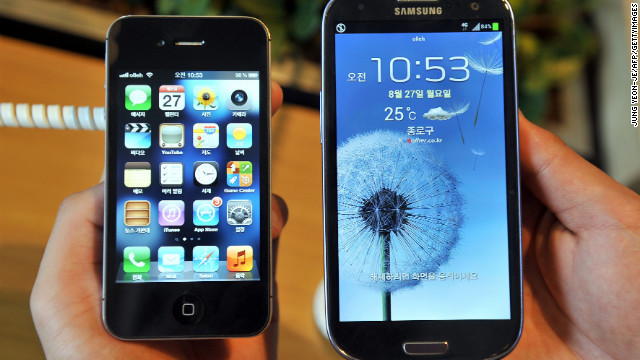
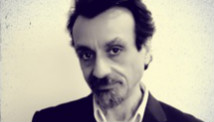


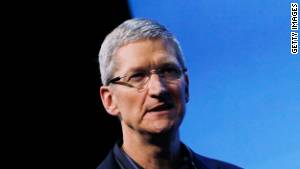
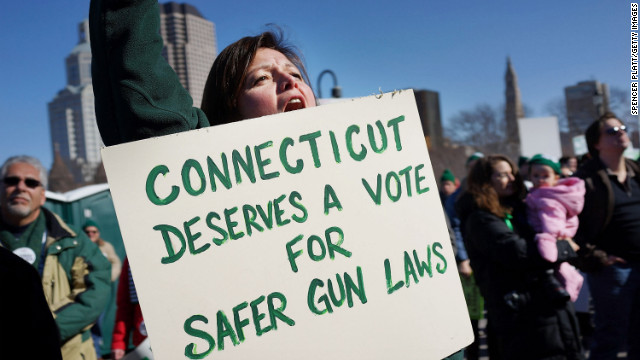
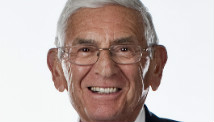

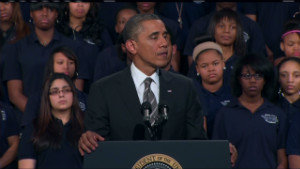
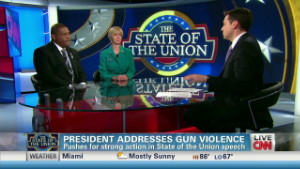
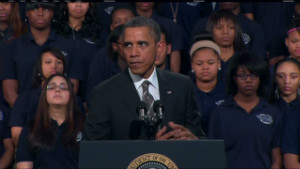
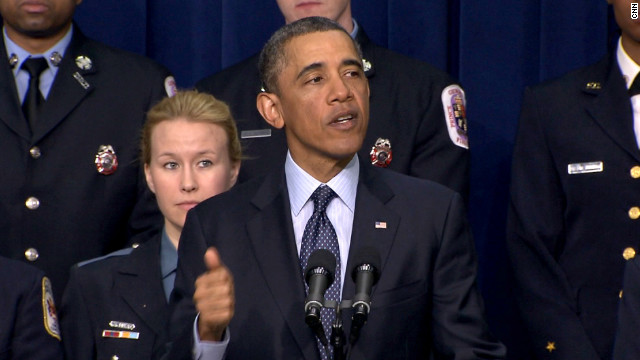



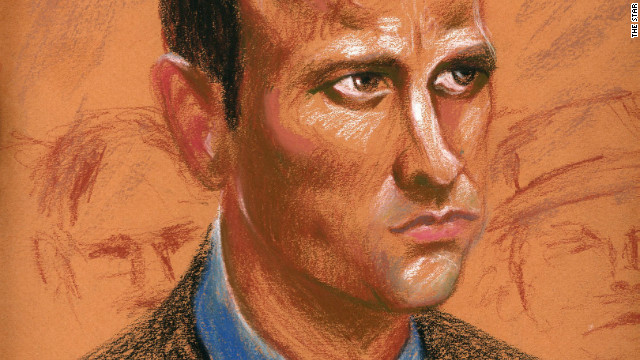
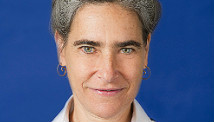


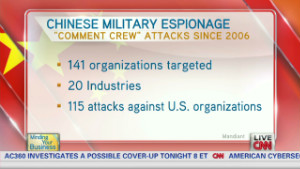
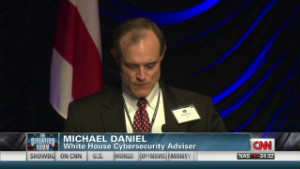
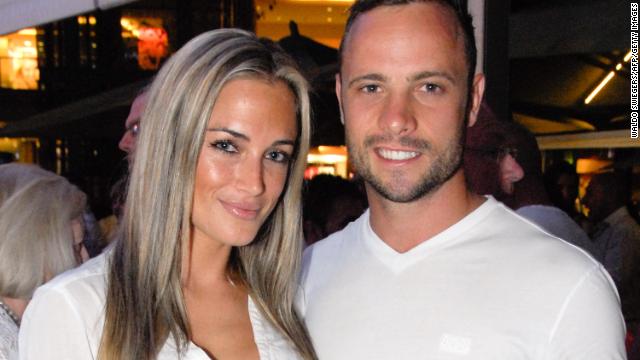
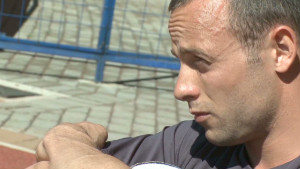
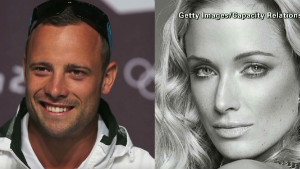


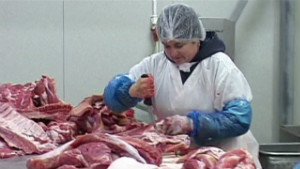



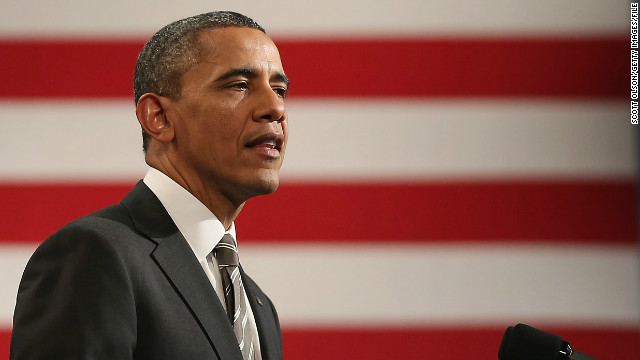


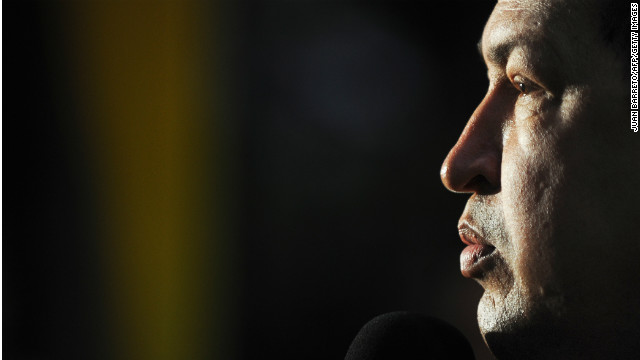

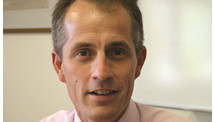



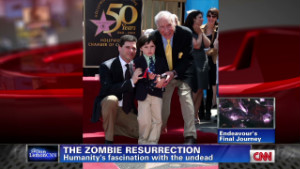

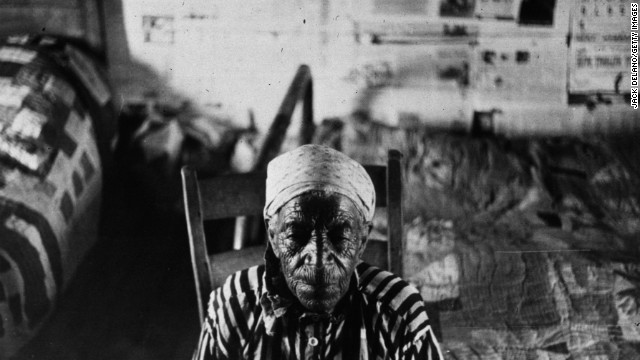




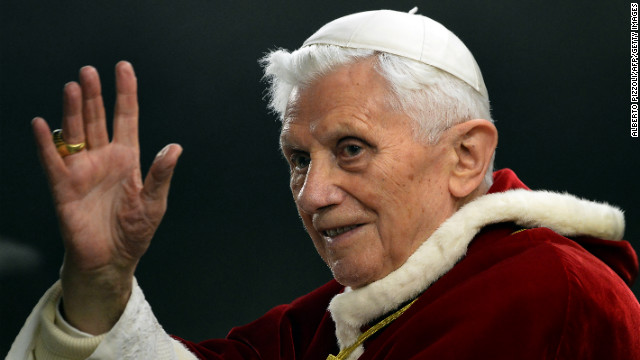 Pope Benedict XVI waves in St. Peter's Square in the Vatican in December 2012. Benedict, 85, announced on Monday, February 11, that he will resign at the end of February "because of advanced age." The last pope to resign was Gregory XII in 1415.
Pope Benedict XVI waves in St. Peter's Square in the Vatican in December 2012. Benedict, 85, announced on Monday, February 11, that he will resign at the end of February "because of advanced age." The last pope to resign was Gregory XII in 1415.
 Joseph Ratzinger, who became the 265th pope in 2005, poses for a photo while a German air force assistant in 1943.
Joseph Ratzinger, who became the 265th pope in 2005, poses for a photo while a German air force assistant in 1943.
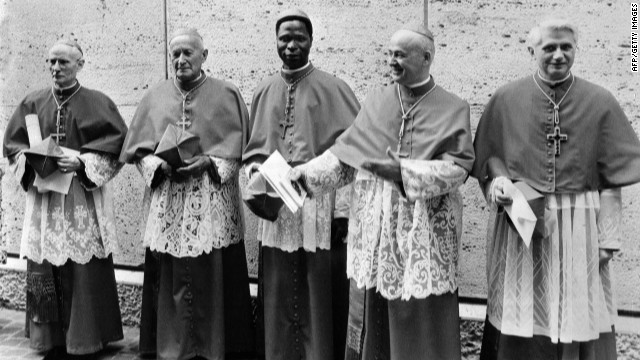 Cardinal Joseph Ratzinger, right, poses for a picture in Vatican City in June 1977 with fellow cardinals, from left, Cardinal Gappi, Cardinal Tomazek, Cardinal Gantin and Cardinal Benelli. Ratzinger was named cardinal-priest of Santa Maria Consolatrice al Tiburtino by Pope Paul VI in June 1977.
Cardinal Joseph Ratzinger, right, poses for a picture in Vatican City in June 1977 with fellow cardinals, from left, Cardinal Gappi, Cardinal Tomazek, Cardinal Gantin and Cardinal Benelli. Ratzinger was named cardinal-priest of Santa Maria Consolatrice al Tiburtino by Pope Paul VI in June 1977.
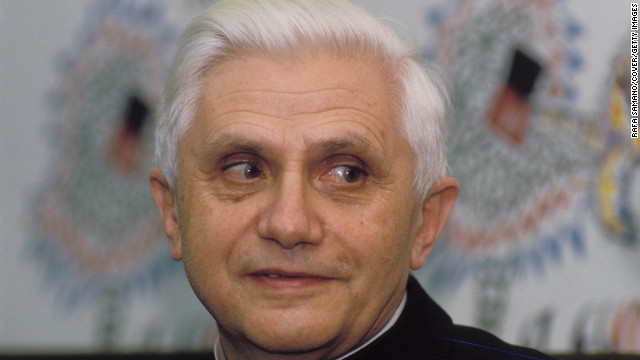 Ratzinger, who was serving as cardinal-priest of Santa Maria Consolatrice al Tiburtino, visits Madrid in 1989.
Ratzinger, who was serving as cardinal-priest of Santa Maria Consolatrice al Tiburtino, visits Madrid in 1989.
 Ratzinger fills in for Pope John Paul II during the Easter Vigil service in Saint Peter's Basilica in March 2005.
Ratzinger fills in for Pope John Paul II during the Easter Vigil service in Saint Peter's Basilica in March 2005.
 Newly elected as pope, Benedict XVI gestures to the crowd in St. Peter's Square in Vatican City on April 19, 2005.
Newly elected as pope, Benedict XVI gestures to the crowd in St. Peter's Square in Vatican City on April 19, 2005.
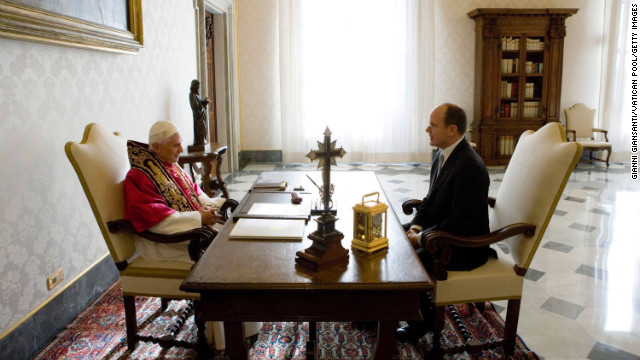 Benedict meets Prince Albert II of Monaco at the pope's private library in Vatican City in December 2005.
Benedict meets Prince Albert II of Monaco at the pope's private library in Vatican City in December 2005.
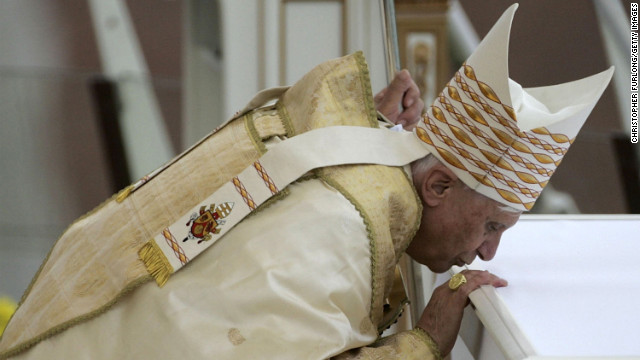 Benedict kisses the altar before addressing the crowds at Jasna Gora Monastery in Czestochowa, Poland, in May 2006.
Benedict kisses the altar before addressing the crowds at Jasna Gora Monastery in Czestochowa, Poland, in May 2006.
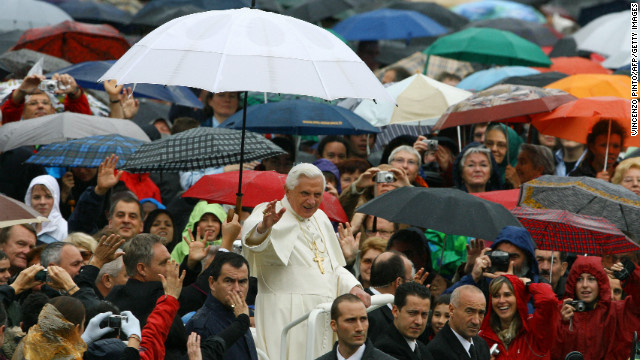 Benedict waves from under an umbrella as he arrives to lead his weekly general audience in Saint Peter's Square at the Vatican in October 2007.
Benedict waves from under an umbrella as he arrives to lead his weekly general audience in Saint Peter's Square at the Vatican in October 2007.
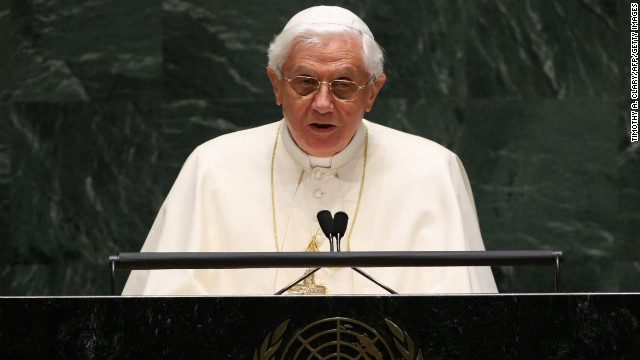 Benedict speaks at the United Nations General Assembly in New York in April 2008.
Benedict speaks at the United Nations General Assembly in New York in April 2008.
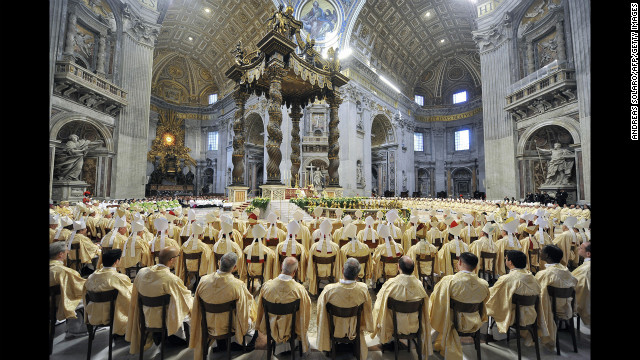 Benedict celebrates a Mass at the end of a synod of Catholic bishops in October 2008 at St. Peter's Basilica at the Vatican.
Benedict celebrates a Mass at the end of a synod of Catholic bishops in October 2008 at St. Peter's Basilica at the Vatican.
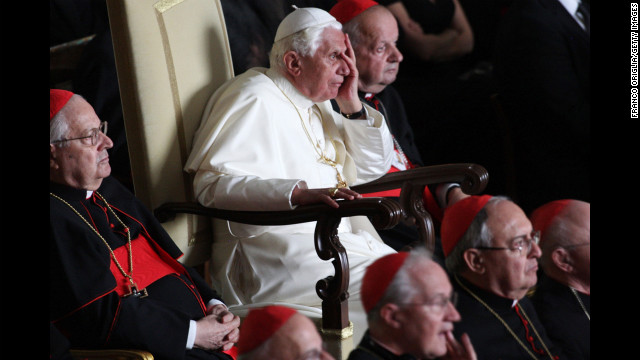 Benedict attends a screening of a movie about his predecessor, Pope John Paul II, on October 16, 2008, in Vatican City during celebrations of the 30th anniversary of John Paul's election as pontiff.
Benedict attends a screening of a movie about his predecessor, Pope John Paul II, on October 16, 2008, in Vatican City during celebrations of the 30th anniversary of John Paul's election as pontiff.
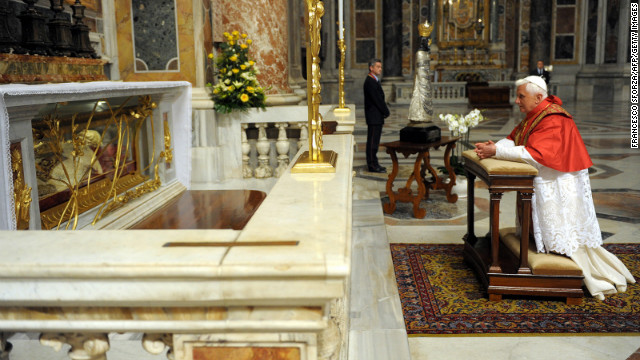 Benedict kneels as he prays in front of Pope John XXIII's tomb in St. Peter's Basilica at the Vatican on October 28, 2008, to commemorate the 50th anniversary of John's election to the papacy.
Benedict kneels as he prays in front of Pope John XXIII's tomb in St. Peter's Basilica at the Vatican on October 28, 2008, to commemorate the 50th anniversary of John's election to the papacy.
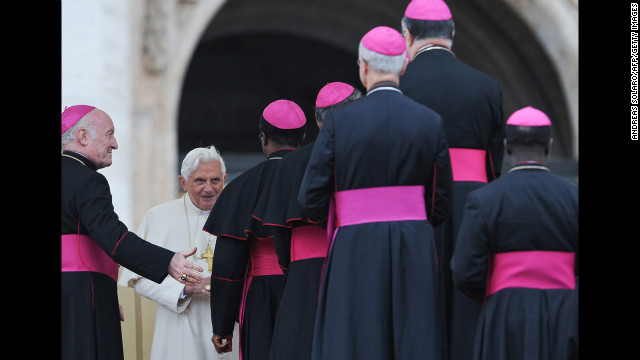 Benedict talks with bishops in Saint Peter's Square at the Vatican after his weekly general address in November 2009.
Benedict talks with bishops in Saint Peter's Square at the Vatican after his weekly general address in November 2009.
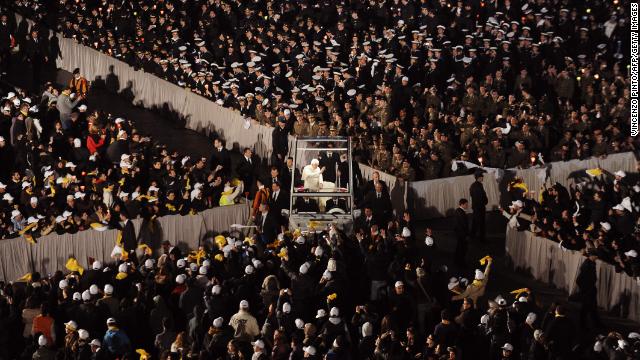 Benedict blesses pilgrims as he arrives in St. Peter's Square in his popemobile in March 2010 to meet with young people from Rome and the Lazio region in preparation for World Youth Day.
Benedict blesses pilgrims as he arrives in St. Peter's Square in his popemobile in March 2010 to meet with young people from Rome and the Lazio region in preparation for World Youth Day.
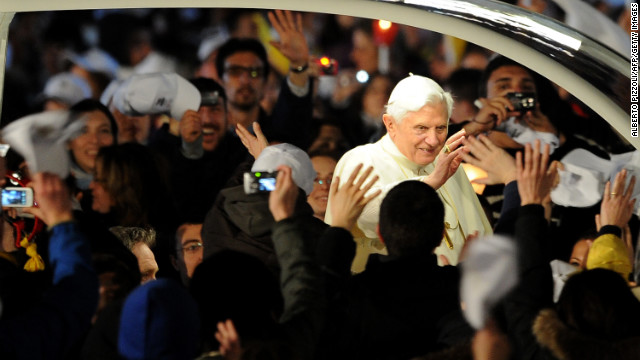 The pope salutes from his popemobile in St. Peter's Square in March 2010.
The pope salutes from his popemobile in St. Peter's Square in March 2010.
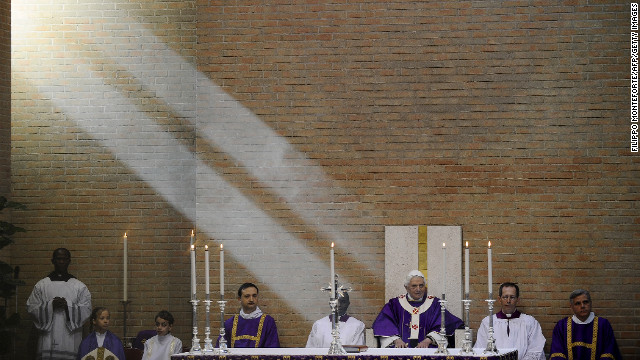 Benedict prepares to celebrate Mass at San Giovanni della Croce parish in Rome in March 2010.
Benedict prepares to celebrate Mass at San Giovanni della Croce parish in Rome in March 2010.
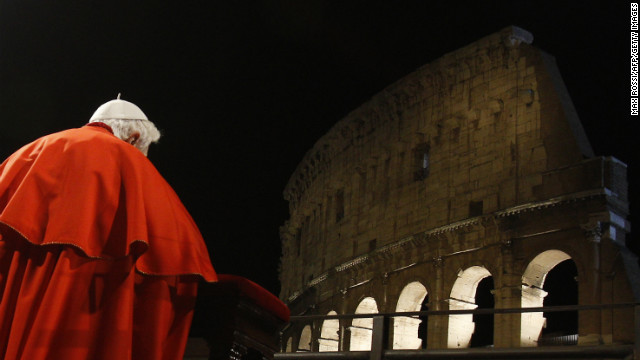 Benedict prays on Good Friday in April 2010 at the Roman Colosseum.
Benedict prays on Good Friday in April 2010 at the Roman Colosseum.
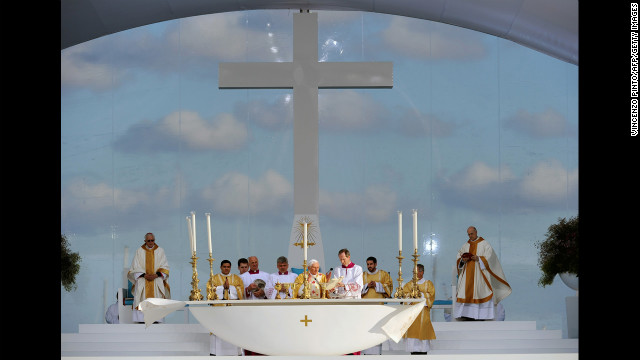 Benedict celebrates an open-air Mass in the Terreiro do Paco in Lisbon, Portugal, in May 2010.
Benedict celebrates an open-air Mass in the Terreiro do Paco in Lisbon, Portugal, in May 2010.
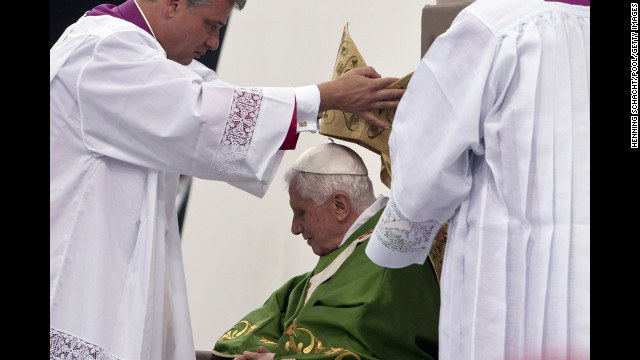 Benedict prepares to celebrate a Mass for 70,000 people in September 2011 in Berlin.
Benedict prepares to celebrate a Mass for 70,000 people in September 2011 in Berlin.
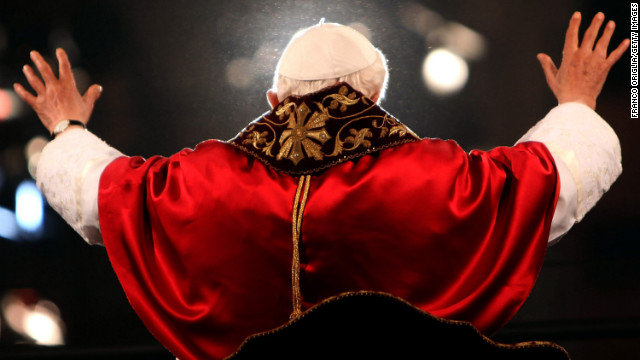 Benedict waves to the crowd gathered at the Colosseum in Rome during the Way of the Cross procession on Good Friday in April 2012.
Benedict waves to the crowd gathered at the Colosseum in Rome during the Way of the Cross procession on Good Friday in April 2012.
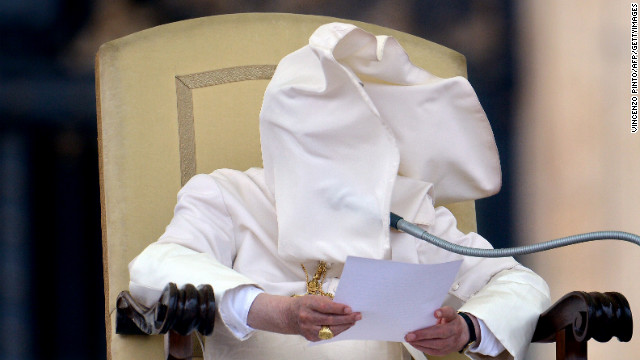 A gust of wind blows Benedict's collar into his face in September 2012 during his weekly address in Saint Peter's Square.
A gust of wind blows Benedict's collar into his face in September 2012 during his weekly address in Saint Peter's Square.
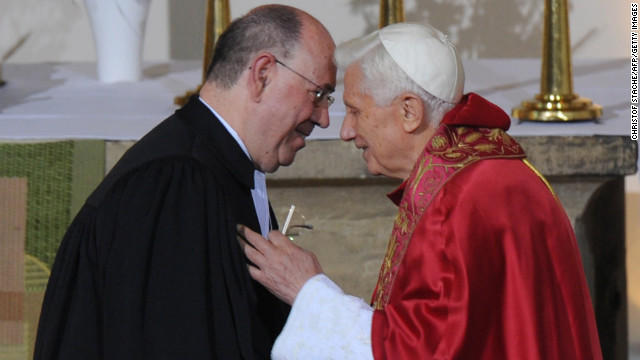 Benedict speaks with Nikolaus Schneider, praeses of the Evangelical Church in the Rhineland, before a Mass at the Augustinian monastery in Erfurt, Germany, in September 2011.
Benedict speaks with Nikolaus Schneider, praeses of the Evangelical Church in the Rhineland, before a Mass at the Augustinian monastery in Erfurt, Germany, in September 2011.
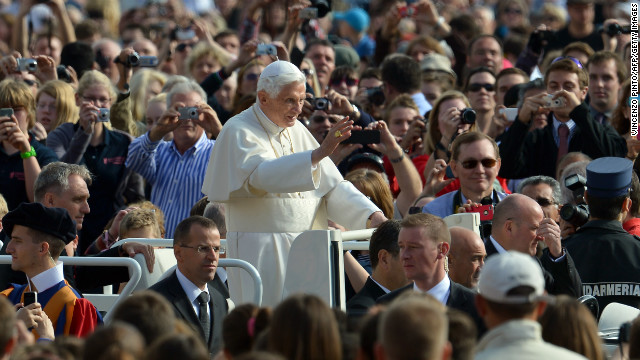 Benedict waves to pilgrims as he arrives at St. Peter's Square for his weekly address in October 2012.
Benedict waves to pilgrims as he arrives at St. Peter's Square for his weekly address in October 2012.
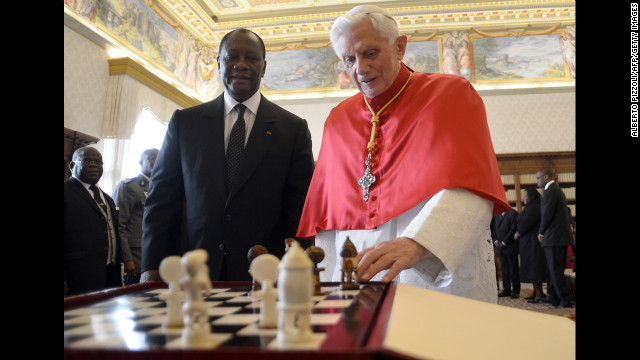 Benedict looks at a chess game with Ivory Coast President Alassane Ouattara during a private audience in November 2012 at the Vatican.
Benedict looks at a chess game with Ivory Coast President Alassane Ouattara during a private audience in November 2012 at the Vatican.
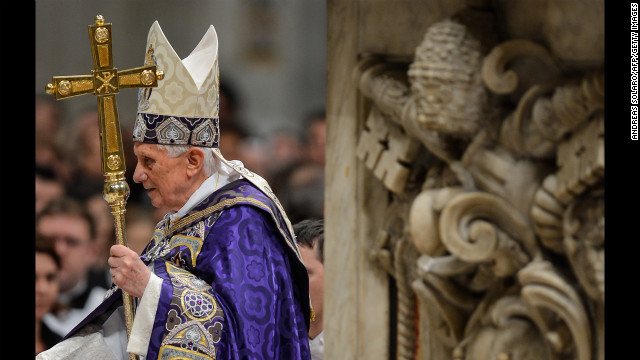 Benedict arrives to lead the Vesper prayer with members of Rome's universities in December 2012 at St. Peter's Basilica.
Benedict arrives to lead the Vesper prayer with members of Rome's universities in December 2012 at St. Peter's Basilica.
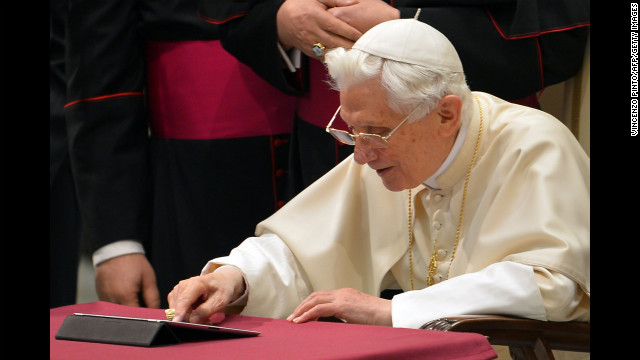 Benedict clicks on a tablet to send his first tweet from his account @pontifex at the Vatican in December 2012.
Benedict clicks on a tablet to send his first tweet from his account @pontifex at the Vatican in December 2012.
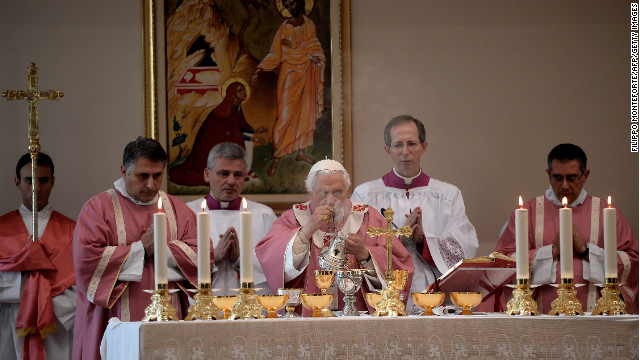 Benedict celebrates Mass during a visit to San Patrizio al Colle Prenestino parish on the outskirts of Rome in December 2012.
Benedict celebrates Mass during a visit to San Patrizio al Colle Prenestino parish on the outskirts of Rome in December 2012.
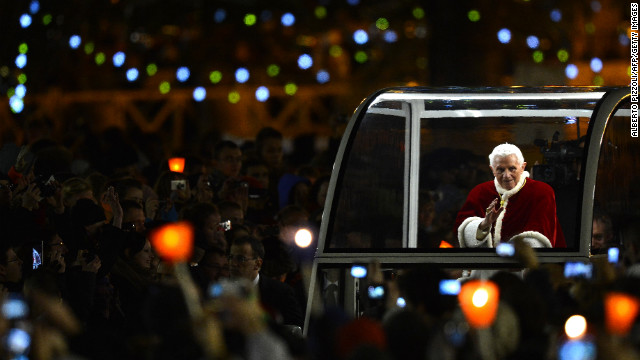 Benedict blesses members of the ecumenical Christian community of Taize, a group based in Taize, France, in St. Peter's Square in December 2012.
Benedict blesses members of the ecumenical Christian community of Taize, a group based in Taize, France, in St. Peter's Square in December 2012.
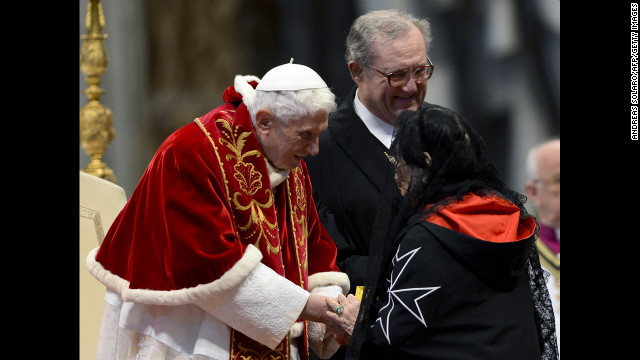 Benedict, accompanied by Grand Master Matthew Festing of the Sovereign Military Order of Malta, right, shakes hands with a woman after the Mass in St. Peter's Basilica to mark the 900th anniversary of the Order of the Knights of Malta on February 9, 2013, at the Vatican.
Benedict, accompanied by Grand Master Matthew Festing of the Sovereign Military Order of Malta, right, shakes hands with a woman after the Mass in St. Peter's Basilica to mark the 900th anniversary of the Order of the Knights of Malta on February 9, 2013, at the Vatican.































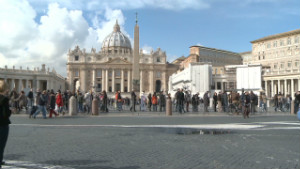
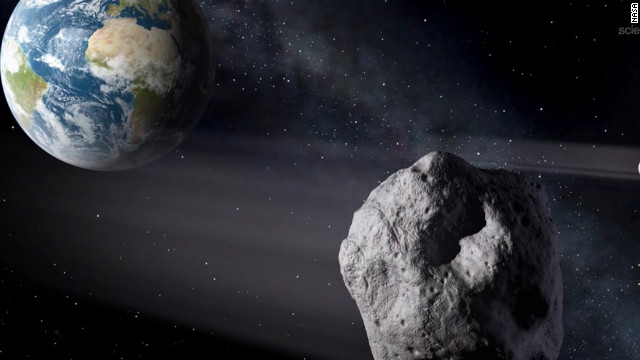 Asteroid 2012 DA14 made a record-close pass -- 17,100 miles -- by Earth on February 15. Most asteroids are made of rocks, but some are metal. They orbit mostly between Jupiter and Mars in the main asteroid belt. Scientists estimate there are tens of thousands of asteroids and when they get close to our planet, they are called near-Earth objects.
Asteroid 2012 DA14 made a record-close pass -- 17,100 miles -- by Earth on February 15. Most asteroids are made of rocks, but some are metal. They orbit mostly between Jupiter and Mars in the main asteroid belt. Scientists estimate there are tens of thousands of asteroids and when they get close to our planet, they are called near-Earth objects.
 This graphic shows Asteroid 2012 DA14's predicted path as it passes closest to Earth on February 15 at 2:24 p.m. ET. It will fly 17,200 miles (27,700 kilometers) above Earth's surface and inside the ring of weather and communications satellites. The asteroid is about 150 feet (45 meters) in diameter. It is heading toward Earth at 17,450 mph.
This graphic shows Asteroid 2012 DA14's predicted path as it passes closest to Earth on February 15 at 2:24 p.m. ET. It will fly 17,200 miles (27,700 kilometers) above Earth's surface and inside the ring of weather and communications satellites. The asteroid is about 150 feet (45 meters) in diameter. It is heading toward Earth at 17,450 mph.
 Another asteroid, Apophis, got a lot of attention from space scientists and the media when initial calculations indicated a small chance it could hit Earth in 2029 or 2036. NASA scientists have since ruled out an impact, but on April 13, 2029, Apophis, which is about the size of 3½ football fields, will make a close visit -- flying about 19,400 miles (31,300 kilometers) above Earth's surface. The images above were taken by the European Space Agency's Herschel Space Observatory in January 2013.
Another asteroid, Apophis, got a lot of attention from space scientists and the media when initial calculations indicated a small chance it could hit Earth in 2029 or 2036. NASA scientists have since ruled out an impact, but on April 13, 2029, Apophis, which is about the size of 3½ football fields, will make a close visit -- flying about 19,400 miles (31,300 kilometers) above Earth's surface. The images above were taken by the European Space Agency's Herschel Space Observatory in January 2013.
 If you really want to know about asteroids, you need to see one up close. NASA did just that. A spacecraft called NEAR-Shoemaker, named in honor of planetary scientist Gene Shoemaker, was the first probe to touch down on an asteroid, landing on the asteroid Eros on February 12, 2001. This image was taken on February 14, 2000, just after the probe began orbiting Eros.
If you really want to know about asteroids, you need to see one up close. NASA did just that. A spacecraft called NEAR-Shoemaker, named in honor of planetary scientist Gene Shoemaker, was the first probe to touch down on an asteroid, landing on the asteroid Eros on February 12, 2001. This image was taken on February 14, 2000, just after the probe began orbiting Eros.
 The first asteroid to be identified, 1 Ceres, was discovered January 1, 1801, by Giuseppe Piazzi in Palermo, Sicily. But is Ceres just another asteroid? Observations by NASA's Hubble Space Telescope show that Ceres has a lot in common with planets like Earth. It's almost round and it may have a lot of pure water ice beneath its surface. Ceres is about 606 by 565 miles (975 by 909 kilometers) in size and scientists say it may be more accurate to call it a mini-planet. NASA's Dawn spacecraft is on its way to Ceres to investigate. The spacecraft is 35 million miles (57 million kilometers) from Ceres and 179 million miles (288 million kilometers) from Earth. The photo on the left was taken by Keck Observatory, Mauna Kea, Hawaii. The image on the right was taken by the Hubble Space Telescope.
The first asteroid to be identified, 1 Ceres, was discovered January 1, 1801, by Giuseppe Piazzi in Palermo, Sicily. But is Ceres just another asteroid? Observations by NASA's Hubble Space Telescope show that Ceres has a lot in common with planets like Earth. It's almost round and it may have a lot of pure water ice beneath its surface. Ceres is about 606 by 565 miles (975 by 909 kilometers) in size and scientists say it may be more accurate to call it a mini-planet. NASA's Dawn spacecraft is on its way to Ceres to investigate. The spacecraft is 35 million miles (57 million kilometers) from Ceres and 179 million miles (288 million kilometers) from Earth. The photo on the left was taken by Keck Observatory, Mauna Kea, Hawaii. The image on the right was taken by the Hubble Space Telescope.
 One big space rock got upgraded recently. This image of Vesta was taken by the Dawn spacecraft, which is on its way to Ceres. In 2012, scientists said data from the spacecraft show Vesta is more like a planet than an asteroid and so Vesta is now considered a protoplanet.
One big space rock got upgraded recently. This image of Vesta was taken by the Dawn spacecraft, which is on its way to Ceres. In 2012, scientists said data from the spacecraft show Vesta is more like a planet than an asteroid and so Vesta is now considered a protoplanet.
 The three-mile long (4.8-kilometer) asteroid Toutatis flew about 4.3 million miles (6.9 million kilometers) from Earth on December 12, 2012. NASA scientists used radar images to
The three-mile long (4.8-kilometer) asteroid Toutatis flew about 4.3 million miles (6.9 million kilometers) from Earth on December 12, 2012. NASA scientists used radar images to 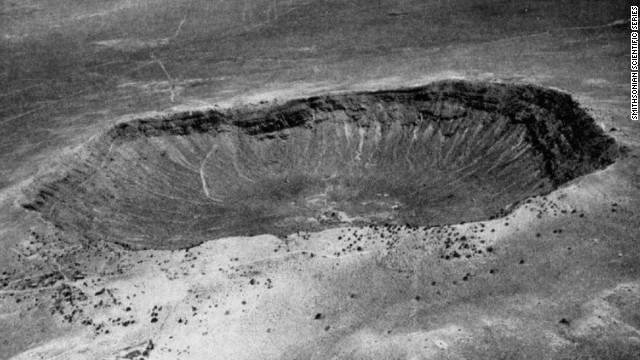 Asteroids have hit Earth many times. It's hard to get an exact count because erosion has wiped away much of the evidence. The mile-wide Meteor Crater in Arizona, seen above, was created by a small asteroid that hit about 50,000 years ago, NASA says. Other famous impact craters on Earth include Manicouagan in Quebec, Canada; Sudbury in Ontario, Canada; Ries Crater in Germany, and Chicxulub on the Yucatan coast in Mexico.
Asteroids have hit Earth many times. It's hard to get an exact count because erosion has wiped away much of the evidence. The mile-wide Meteor Crater in Arizona, seen above, was created by a small asteroid that hit about 50,000 years ago, NASA says. Other famous impact craters on Earth include Manicouagan in Quebec, Canada; Sudbury in Ontario, Canada; Ries Crater in Germany, and Chicxulub on the Yucatan coast in Mexico.
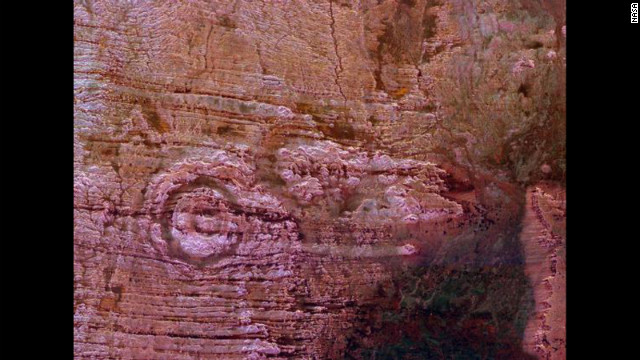 NASA scientists say the impact of an asteroid or comet several hundred million years ago created the Aorounga crater in the Sahara Desert of northern Chad. The crater has a diameter of about 10.5 miles (17 kilometers). This image was taken by the Space Shuttle Endeavour in 1994.
NASA scientists say the impact of an asteroid or comet several hundred million years ago created the Aorounga crater in the Sahara Desert of northern Chad. The crater has a diameter of about 10.5 miles (17 kilometers). This image was taken by the Space Shuttle Endeavour in 1994.
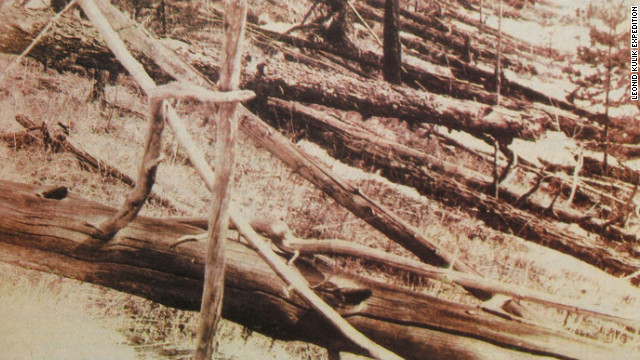 In 1908 in Tunguska, Siberia, scientists theorize an asteroid flattened about 750 square miles (1,200 square kilometers) of forest in and around the Podkamennaya Tunguska River in what is now Krasnoyarsk Krai, Russia.
In 1908 in Tunguska, Siberia, scientists theorize an asteroid flattened about 750 square miles (1,200 square kilometers) of forest in and around the Podkamennaya Tunguska River in what is now Krasnoyarsk Krai, Russia.
 What else is up there? Is anyone watching? NASA's
What else is up there? Is anyone watching? NASA's 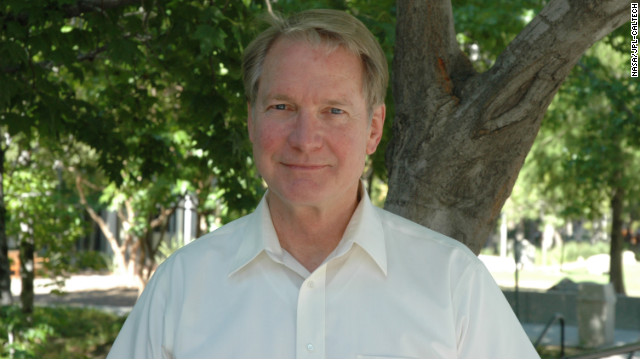 One of the top asteroid-tracking scientists is Don Yeomans at the Jet Propulsion Laboratory, which is managed by the California Institute of Technology. Yeomans says every day, "Earth is pummeled by more than 100 tons of material that spewed off asteroids and comets." Fortunately, most of the asteroid trash is tiny and it burns up when it hits the atmosphere, creating meteors, or shooting stars. Yeomans says it's very rare for big chunks of space litter to hit Earth's surface. Those chunks are called meteorites.
One of the top asteroid-tracking scientists is Don Yeomans at the Jet Propulsion Laboratory, which is managed by the California Institute of Technology. Yeomans says every day, "Earth is pummeled by more than 100 tons of material that spewed off asteroids and comets." Fortunately, most of the asteroid trash is tiny and it burns up when it hits the atmosphere, creating meteors, or shooting stars. Yeomans says it's very rare for big chunks of space litter to hit Earth's surface. Those chunks are called meteorites.
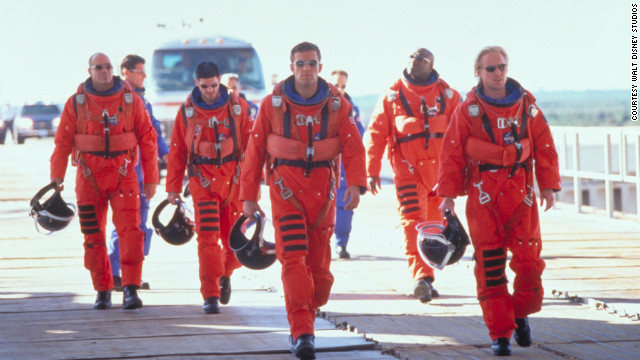 Asteroids and comets are popular fodder for Earth-ending science fiction movies. Two of the biggest blockbusters came out in 1998: "Deep Impact" and "Armageddon." (Walt Disney Studios) Others include "Meteorites!" (1998), "Doomsday Rock" (1997), "Asteroid" (1997), "Meteor" (1979), and "A Fire in the Sky" (1978). Can you name others?
Asteroids and comets are popular fodder for Earth-ending science fiction movies. Two of the biggest blockbusters came out in 1998: "Deep Impact" and "Armageddon." (Walt Disney Studios) Others include "Meteorites!" (1998), "Doomsday Rock" (1997), "Asteroid" (1997), "Meteor" (1979), and "A Fire in the Sky" (1978). Can you name others?














 A large chunk of a meteor that exploded over Russia is found in a late on Friday, February 15.
A large chunk of a meteor that exploded over Russia is found in a late on Friday, February 15.
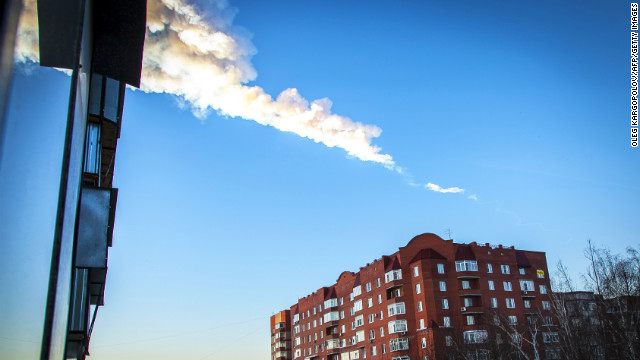 A meteor streaks through the sky before exploding with a flash and boom that shattered glass in buildings and left hundreds of people hurt.
A meteor streaks through the sky before exploding with a flash and boom that shattered glass in buildings and left hundreds of people hurt.
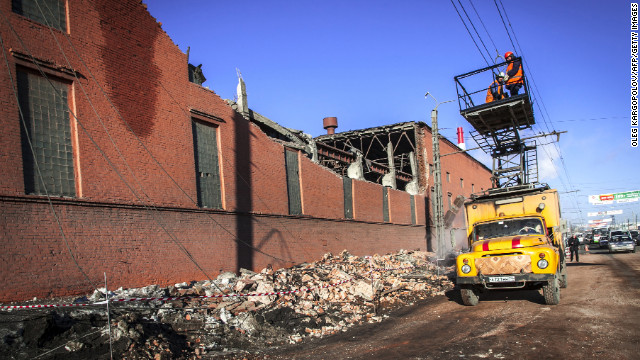 Workers repair a damaged power line near the wall of a local zinc plant. About 270 buildings were damaged -- mostly broken glass -- by shock waves caused by the blast, said Vladimir Stepanov of the National Center for Emergency Situations at the Russian Interior Ministry.
Workers repair a damaged power line near the wall of a local zinc plant. About 270 buildings were damaged -- mostly broken glass -- by shock waves caused by the blast, said Vladimir Stepanov of the National Center for Emergency Situations at the Russian Interior Ministry.
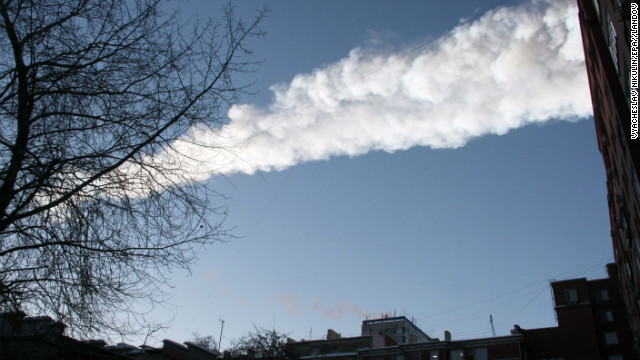 The meteor leaves a white streak through the sky. The national space agency, Roscosmos, said scientists believed one meteoroid had entered the atmosphere, where it burned and disintegrated into fragments, according to RIA Novosti.
The meteor leaves a white streak through the sky. The national space agency, Roscosmos, said scientists believed one meteoroid had entered the atmosphere, where it burned and disintegrated into fragments, according to RIA Novosti.
 The meteor's vapor trail passes over the city.
The meteor's vapor trail passes over the city.
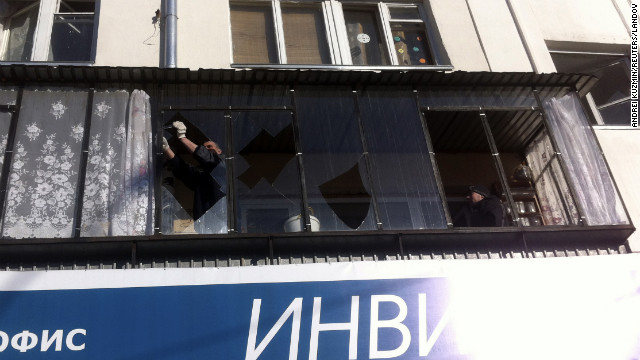 A man removes shards of glass from the frame of a broken window.
A man removes shards of glass from the frame of a broken window.
 The meteor damaged windows at a sports hall.
The meteor damaged windows at a sports hall.
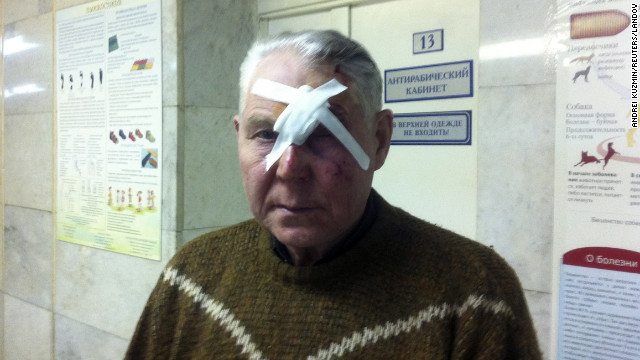 By noon Russia time more than 725 people had sought medical help.
By noon Russia time more than 725 people had sought medical help.


